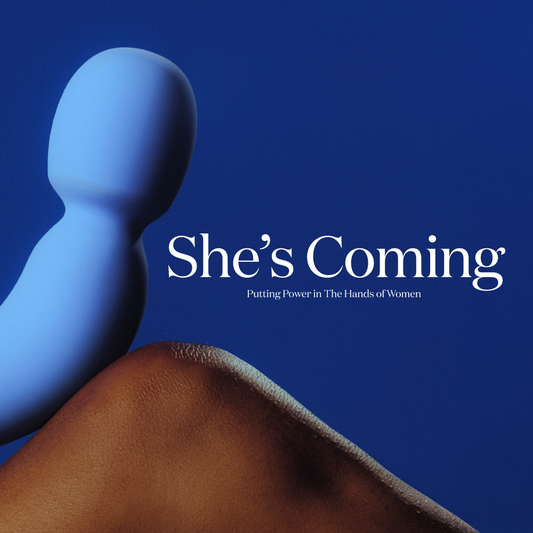Last month marked the second anniversary of the Harvey Weinstein allegations, which kicked off a nationwide movement that reckoned with issues like assault, harassment, consent, and institutional misogyny. A lot of people—especially men—were wondering how to be respectful, kind, and thoughtful in a rapidly changing world. Enter Peabody-nominated journalist Cleo Stiller and her new book, Modern Manhood, out now from Simon & Schuster. Each chapter examines a different aspect of masculinity (like Sex, Friendships, Work, and Money). The book delves into the hard-to-talk-about “gray areas,” through candid conversations with regular, well-meaning people just trying to figure it all out. Cleo spoke with Dame about masculinity, #MeToo, self-care, and more.
Dame: Why did you decide to write a book about masculinity? What's the central dilemma you were trying to get at with Modern Manhood?
Cleo Stiller: For the last five years, I hosted a television show on Univision’s cable news network Fusion called Sex.Right.Now. with Cleo Stiller. The show covered everything from health, to relationships and reproductive rights, to body confidence and gender identity and how technology and cultural politics were impacting these spaces in our lives. Basically, it was a deeply intimate and personal show and I developed the reputation of treating people’s stories with a genuine no-shame, no-stigma tone. So, rewind back to 2017, we are airing the third season of Sex.Right.Now. when the Harvey Weinstein scandal broke and #MeToo hit the mainstream. A lot of folks who watched my show, mostly straight men, started reaching out to me to see if we were going to do a season on what was happening. They would write, “I’m a single guy, and I’m terrified to approach women right now. It seems like everything I was taught to do is now considered creepy. I don’t want to end up the next Aziz Ansari. What do I do?” or “I’m a new dad and I’m watching this Kavanaugh hearing and thinking, ‘Oh my god, how do I raise a ‘good son’ when I don’t even know what that means anymore?!’” or “I’m a manager with a lot of hiring power and I wouldn’t confess to this publicly but I’m afraid to mentor my female employees.” Meanwhile, I was attending a lot of events about #MeToo and where to go from here, but they were mostly attended by women and survivors. Inevitably someone would say, “Where are all the men? Where are our allies? They don’t care.” And I knew — they did care! Men are talking about this stuff. They’re having these conversations on group texts with their friends, fumbling through them with their partners. Modern Manhood brings multiple perspectives to the table. It’s a crowdsourced document of sorts. And it’s an attempt to ensure that we don’t miss this opportunity to move forward together and upgrade our collective behavior and values.
Dame: Since we are all about sexuality and pleasure, let's get right into the sex. You mentioned the famous Aziz Ansari #MeToo incident, where he allegedly badgered a woman into going further than she wanted to. Why is this incident so key for you? And what did we (or should we) learn from that cultural moment?
CS: Oh man, I heard more about Aziz Ansari from folks than maybe anyone else. Basically the Aziz Ansari was like a Rorschach test — the way people reacted to hearing that story said a lot about how they felt about the more insidious coercion encompassed by #MeToo. It wasn’t broken down by gender lines, either. I spoke to men who said their wives or female friends had told them all similar stories that they had experienced and this behavior was awful, and unacceptable. And, I spoke to women who thought it was no big deal. I spoke to one public school teacher in the Bronx who told me, “That’s just a bad date. It’s like every college experience I had. She could have just left!”
Men are often taught they need to game women into hooking up with them, which sets up this idea that women are the gatekeepers of sex.
And my point, and the reason I really wanted to drill down on this situation was, yes, this is a very, very common situation, but that doesn’t mean that we shouldn’t try to upgrade the status quo. We can and we should do better. Your date should not go home in the cab in tears. Sex is set up in our society almost like an adversarial act. It’s something you take from someone else. Men are often taught they need to game women into hooking up with them, which sets up this idea that women are the gatekeepers of sex (not fair, not accurate). I interviewed one woman, Lux Alptraum, who is a sex educator and author of Faking It: The Lies Women Tell and What They Reveal. She had a great recommendation: Think of sex like a meal out with a friend. You want to both enjoy the meal together, so you’re going to talk and check in the whole time. No one is going to rush to finish the meal way before the other person does. And you may not love the same food, so there’s compromise, too. Maybe one time you do Mexican food because that’s your favorite and the next time you go to Japanese food for your friend.
Dame: We also think a lot about wellness, so let's talk about self-care: Why are men so bad at it, and how do men distinguish between mental and physical self-care?
CS: I started by asking a lot of men what self-care looked liked for them. I got a lot of blank stares. Then one man, Bryan Stacy, the founder of the sexual health company Biem, told me I needed to stop using the term “self-care” and instead frame this chapter as lifehacks, performance boosting tips, etc. This all gets to this idea we’ve cultivated as a society that “taking care of yourself” is weak and thus feminine and not something men should be interested in. Unless it’s working out at the gym. Even if you look at the rise of meditation practices in certain circles, it’s less about individual wellness and framed more as a way to become a more efficient and productive worker. And yet we know this does not work. Men die by suicide at more than 3.5 times the rate of women. A huge reason why is what’s called “deaths of despair”: suicides and deaths from drug overdose and alcohol abuse. Men tend to overdose at more than twice the rate of women. The problem has crystallized to such proportions that the American Psychological Association developed new guidelines for therapists working with men and boys in 2018. Those guidelines claim that “traditional masculine ideology” harms males. I spoke with several therapists about how they combat the stigma of men seeking mental health treatment. One told me she doesn’t use the term “therapy” in her practice. She refers to it instead as “self-inquiry” more along the lines of ancient philosophical traditions. Another therapist told me she frames her counseling less something you pursue because there’s something wrong with you and more because it’s empowering to take control of your life and change it for the better.
Dame: What would you say to people who ask why a woman is writing this book? Shouldn't men be talking to other men about this stuff?
CS: That’s a great question. Yes, men should be talking to each other about this stuff — and they are! But women (and all genders) should be talking to cis men about this as well and vice versa. To move forward on this in a way that benefits everyone, we need multiple perspectives at the table. We need to come with compassion and empathy and curiosity, and we need to listen to each other. It’s very understandable that many women and survivors are not ready to have this conversation, and that’s fine. But for those of us who are, we have to. And I was happy for Modern Manhood to be a vessel in what I think is going to be one of the most important cultural conversations of this new decade. Buy Cleo’s book, Modern Manhood, here!




















































